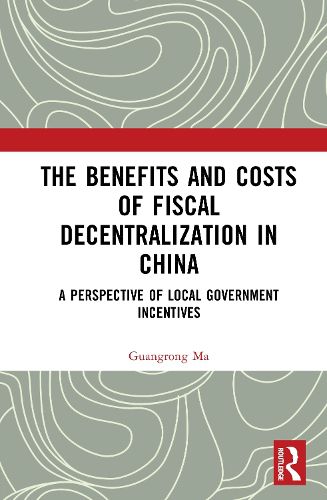Readings Newsletter
Become a Readings Member to make your shopping experience even easier.
Sign in or sign up for free!
You’re not far away from qualifying for FREE standard shipping within Australia
You’ve qualified for FREE standard shipping within Australia
The cart is loading…






This book examines China's fiscal decentralization and its economic impact through local government incentives. It focuses on three key areas: expenditure decentralization, revenue decentralization and intergovernmental transfers. The analysis weighs the benefits and costs of these fiscal practices in terms of China's economic development. The author observes that China's high degree of fiscal expenditure and revenue decentralization has empowered local governments to pursue economic development vigorously. However, it has also caused insufficient incentives for providing public welfare services and adjusting income distribution. This has exacerbated local protectionism and fragmented the domestic market. While intergovernmental transfers to less developed regions have gradually improved fiscal equalization and mitigated regional disparities since the 1994 tax-sharing reform, they have weakened the economic development incentives of recipient local governments. The book concludes with reform proposals for optimizing central-local fiscal relations. This book will be of interest to scholars of the Chinese economy, public finance and development economics.
$9.00 standard shipping within Australia
FREE standard shipping within Australia for orders over $100.00
Express & International shipping calculated at checkout
Stock availability can be subject to change without notice. We recommend calling the shop or contacting our online team to check availability of low stock items. Please see our Shopping Online page for more details.
This book examines China's fiscal decentralization and its economic impact through local government incentives. It focuses on three key areas: expenditure decentralization, revenue decentralization and intergovernmental transfers. The analysis weighs the benefits and costs of these fiscal practices in terms of China's economic development. The author observes that China's high degree of fiscal expenditure and revenue decentralization has empowered local governments to pursue economic development vigorously. However, it has also caused insufficient incentives for providing public welfare services and adjusting income distribution. This has exacerbated local protectionism and fragmented the domestic market. While intergovernmental transfers to less developed regions have gradually improved fiscal equalization and mitigated regional disparities since the 1994 tax-sharing reform, they have weakened the economic development incentives of recipient local governments. The book concludes with reform proposals for optimizing central-local fiscal relations. This book will be of interest to scholars of the Chinese economy, public finance and development economics.